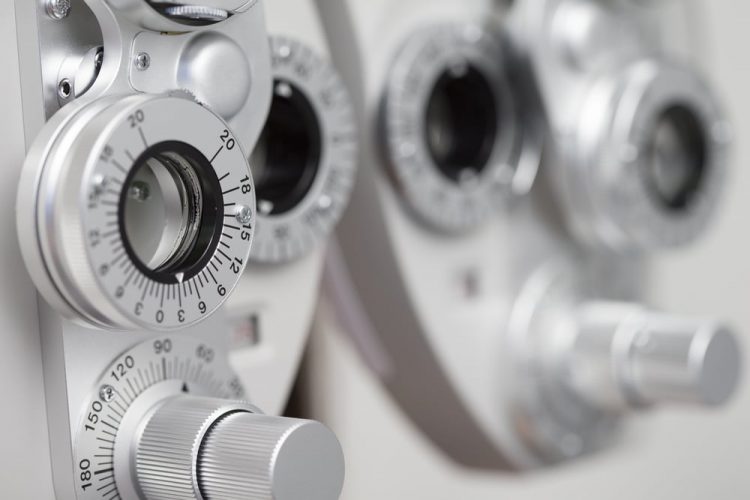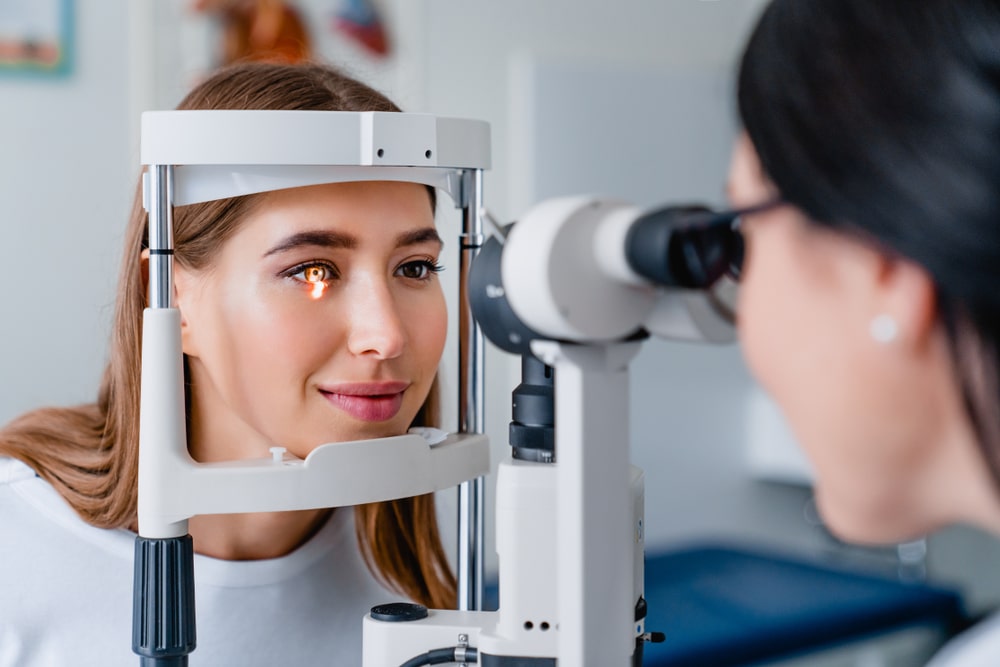General Eye Care
If you are searching for caring and dedicated eye doctors, look no further. Our experienced eye doctors at Traverse City Eye are committed to helping you maintain your vision and eye health, so you can see your life vividly for years to come.
How Often Should I See an Eye Doctor?

How often you need to see your eye doctor depends on several factors. Your eye doctor will tell you how frequently you need to schedule visits depending on your overall health, family history, and current vision complaints.
Age
If you are young and have healthy eyes, your eye doctor may recommend you come in for an exam every one to two years. Age is a risk factor for many eye conditions, so if you are in your fifties or older, your eye doctor may want to see you more frequently.
Family History of Certain Eye Conditions
Another factor that may affect how often you will need to visit your eye doctor is family history. If your family has a strong history of macular degeneration or glaucoma, your eye doctor may want to see you more than once a year.
Early detection is critical for vision preservation since these conditions can cause permanent vision changes if left untreated. Family history can cause you to be at increased risk for certain eye conditions.
Current or Previous Eye Conditions
Your eye doctor will also consider any of your previous or current eye conditions when determining how often you need to be seen. To ensure the health of your eyes, your eye doctor may want to examine them closely multiple times a year.
If you are experiencing any eye conditions like dry eye or recurrent infections, your eye doctor will likely want to see you regularly in the office. Your eye doctor will want to have these conditions under control and adequately managed before allowing you to go longer without a visit.
Urgent Visits
Of course, you should always see your eye doctor urgently if you experience any severe eye pain or significant changes in your vision. It is especially important to seek treatment if you experience any new floaters or see any flashes of light. These symptoms can indicate a retinal detachment. Retinal detachments can be vision-threatening if not treated promptly.
What Should I Expect at My Routine Eye Exam?

When you see your eye doctor for your yearly routine, they will want to be up to date on any changes to your medical history in the previous year. Since many health conditions can affect your eyes, it is important to share any new diagnoses or surgeries you have had since you were last seen with your eye doctor.
Your eye doctor will also want to know what medications you are currently taking, as those can influence your vision and eyes as well. The first step in an eye exam is gathering all necessary information, so your eye doctor knows what to look for during their examination.
Be sure to report any changes in your vision or eyes. Your eye doctor at Traverse City Eye cares about the quality of your vision and wants to help you solve any eye concerns you may have.
After asking you about your medications, recent health changes, and vision, your eye doctor or technician will begin examining your eyes.
Visual Acuity
The first step is often testing your visual acuity. Your eye doctor or technician will ask you to look at a chart and read letters, one eye at a time. Visual acuity testing will tell your eye doctor how well you can see. They can also use this measurement to compare to other visits to see if your vision has changed. After testing your vision, the eye care professional will perform a few different tests to screen the health of your eyes.
Peripheral Vision and Pupil Testing
They will test your peripheral vision, which is what you see out of the corner of your eye. They will also look at your pupils with a bright light to ensure the pupil reacts to the light how it is supposed to.
Tonometry
They will also perform a test called tonometry which tests your eye pressure. Since high eye pressure can be a sign of glaucoma, this test is a very important part of a comprehensive eye exam.
Refraction
If you wear glasses or contact lenses, the technician or eye doctor will ensure you are wearing the correct prescription by performing a refraction test. You will be shown different lenses during a refraction test and asked which lens is clearer to you.
Eye Doctor’s Examination
After this, your eye doctor will begin their close examination of your eyes. To do this, they will use a special magnifying lens and a microscope to look at all the intricacies of your eyes. Once you are given a healthy report, your eye doctor will tell you when they recommend you come back and see them for an exam.
What Questions Should I Ask My Eye Doctor at My Next Eye Exam?
Your yearly exam is more than routine, it is an opportunity to learn more about the health of your eyes and ask any questions that may have arisen throughout the year.
Cataracts
Cataracts are a common cause of decreased vision, and your chances of developing cataracts increases as you age. If you are experiencing blurry vision, glare from light sources, or are fifty or above, you may want to ask your doctor about cataracts.
Cataracts are a natural clouding of the eye’s lens that tends to happen slowly over time. The best treatment for the vision decreases associated with cataracts is cataract surgery.
Your eye doctor will monitor the progression of your cataracts and inform you when they believe it may be time for cataract surgery.
Contact Lenses

If you wear glasses and are looking for an alternative way to have clear vision that does not alter your appearance, you may want to ask your eye doctor about contact lenses. Contact lenses are a popular option for vision correction in those who don’t want to wear glasses.
If you might be interested in this, tell your eye doctor. They will determine if you would be a good candidate for contact lenses and, if so, will provide you with a trial pair to see how you like them.
Other Eye Conditions
If you have a family history of certain eye conditions, you may want to ask your eye doctor about your chances of developing those eye conditions. Some eye conditions seem to be hereditary, where others do not. Your eye doctor can give you some insight on what to expect based on your family history. This way, you can be proactive in your eye care.
What are Refractive Errors?
If you wear glasses or contact lenses, you are one of the many people worldwide who have a refractive error. Refractive errors are caused by the natural way your eye developed and can cause varying degrees of blurred vision.
In order for your eyes to produce a clear image, the light coming into your eye has to fall directly on the retina. The retina is the layer of photosensitive cells at the back of your eye that helps form images for you to see. When the light does not fall in the correct placement on the retina, your vision will be blurry and out of focus. This can be caused by various factors like the length of your eye or the shape of your cornea.
The three types of refractive errors are nearsightedness, farsightedness, and astigmatism. Unless severe, all three types of refractive errors are generally corrected with either glasses or contact lenses. Glasses and contact lenses help the light fall correctly on the retina and allow you to see clearly.
Are you ready to see your eye doctor for a comprehensive eye exam? Schedule an appointment at Traverse City Eye in Traverse City, MI, today!
